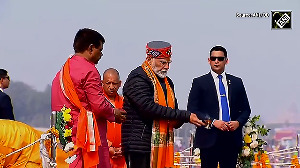People are different. Then again, people are similar.
 Vijay Thadani learnt that the hard way when he moved to Atlanta as NIIT USA's chairman. Back home in India, he'd hug colleagues to show appreciation at the effort they put in. When he did that in the US, it freaked out local employees -- some recoiled, others turned indignant.
Vijay Thadani learnt that the hard way when he moved to Atlanta as NIIT USA's chairman. Back home in India, he'd hug colleagues to show appreciation at the effort they put in. When he did that in the US, it freaked out local employees -- some recoiled, others turned indignant.
Four years later, at Thadani's farewell, the same Americans lined up to give him a special goodbye gift: a hug from each employee. "People are like onions," says Thadani, who is now CEO of NIIT Limited.
"If you peel away four layers, everyone is the same. But they do have those four layers of culture on top, which makes them different."
When NIIT first thought about going global, it wondered what kind of organisation it should build: an exporter of services? An Indian company with offices in many countries? Or a multinational?
In every discussion, issues like taxation and cost structures evaporated. "The discussion always came around to how to manage people. The rest were optimisation decisions," says Rajendra S Pawar, the chairman of the Rs 1,423-crore (Rs 14.23 billion -- 18 months' turnover) NIIT Group.
"If you are building a global organisation, the maximisation decisions come from your people philosophy, policies, processes and people practices."
The fundamentals of building a global organisation are similar to building a domestic organisation -- you need strategy, leadership and a motivated workforce. But it's more complex. Multiple markets, multiple cultures, a global workforce and the need for leaders who can frame the world globally rather than multi-domestically -- those factors increase the challenge exponentially.
Explains Noel M Tichy, professor, organisational behaviour and human resource management at the University of Michigan Business School, and the co-architect of General Electric's global organisation: "Any firm that goes global has to re-examine its leadership pipeline."
Tichy, who has tracked India since 1988, sees at least two major challenges that emerging globalisers from India will face: bringing global diversity to top leadership and fighting the global war for talent.
That's the good news. Talk to any global manager from India, and it becomes clear how complex building a global organisation is compared to building an organisation with offices abroad.
 For instance, Thadani believes that NIIT has already gone through four phases of globalisation. The first phase was what he euphemistically calls the kabaddi years. Like a kabaddi player, a manager is sent to a foreign market to hunt for business, lives out of a suitcase and is perpetually on the move until his breath (read: dollars) runs out. The second phase, from 1994 to 1998, was when NIIT tried to emulate the model of a typical multinational corporation.
For instance, Thadani believes that NIIT has already gone through four phases of globalisation. The first phase was what he euphemistically calls the kabaddi years. Like a kabaddi player, a manager is sent to a foreign market to hunt for business, lives out of a suitcase and is perpetually on the move until his breath (read: dollars) runs out. The second phase, from 1994 to 1998, was when NIIT tried to emulate the model of a typical multinational corporation.
"That's when you retain the company's culture. You try to be the parent organisation in a foreign land," explains Thadani.
That didn't work too well. NIIT found business but organisation development stalled. In 1999, when Thadani moved to the US, it marked the third stage: a global organisation with a local presence.
That's a model familiar to many emerging globalisers: a member from the senior management team relocates abroad to lead local managers. That phase lasted less than a year.
Thadani quickly realised that NIIT would need to move to yet another model; one that was scalable and stable. "NIIT had to be a local organisation with a global face. We had to be part of the local landscape," says Thadani.
NIIT's experience contrasts sharply with the model that American multinationals follow. They have the resources to attract the best talent anywhere in the world, and set up shop with a show of strength. A one-size-fits-all strategy works well: Coke employees all over the world know that Atlanta calls the shots.
On the other hand, says Pawar: "Globalisation for us means that in each country, employees should feel that NIIT's head quarters are in that country."
This approach has helped NIIT take on both the challenges Tichy raises: diversity in top leadership as well as winning the war for talent. At the same time, it has also raised some paradoxes.
Paradox 1:
Think continuum, act consistent
There isn't one way -- or even half a dozen ways -- of running a global organisation. Smart companies encourage managers to embrace ambiguity. About five years ago, Tichy recalls he was in a meeting with Ford's top 300 managers.
While everyone else talked about global strategy, the head of Ford's South Africa operations differed. His No. 1 priority was teaching his workforce how to deal with AIDS.
Too many Ford workers were dying of the disease. "He felt that his job was to keep Ford workers alive," says Tichy. "If a company has good leaders, they will make decisions locally that are sensitive to local cultures and consistent with the global corporation's values."
That's easier said than done, though. NIIT realised that a best practice in the US is often anathema in Japan and an abomination in Europe.
Take appraisals, for example. American employees expect forthright feedback; in Japan, feedback has to be extremely subtle. Consider hiring practices: the US has legal restrictions on the extent of information that can be sought from employees. In a developing country, employees are even willing to subject themselves to psychological profiling.
How do you manage across a whole spectrum of options and needs and yet maintain a semblance of consistency? The answer lies in recognising that the underpinning of the organisation is in its processes, but that processes need to be implemented differently in different countries.
Says Tichy: "A global organisation has to develop a culture that is global and unique to that company. The global culture transcends local cultures and, at the same time, respects national and ethnic differences."
It's only when Thadani moved to the US that he realised how complex issues could be. On the one hand, even simple rules for taking leave could cause havoc. The idea of 14 days of "casual leave" spread over 12 months made no sense to American employees who preferred taking a two-week annual vacation.
On the other hand, many things that NIIT did drew employee approval across the globe. NIIT in India always celebrated "Happy Nappy Day" by giving employees a day off on their birthdays. NIIT employees are from 19 nationalities -- all love the idea.
Another global favourite: on January 1, every NIIT-ian gets an off to celebrate "Granny Gratitude Day" and spend time with senior family members. "We underestimate the impact cultural differences can have on the success or failure of a global organisation," says Thadani. "You have to find the lowest common denominators. What is it that everybody likes? Then, highlight them."
Finding what makes local people tick requires immersion in the local society -- as quickly and as deeply as possible. When the Atlanta Chamber of Commerce offered local business leaders the chance to run a local school for a day as a principal, Thadani instantly volunteered.
He figured it would not just expose him to what matters to his employees, but also their children. "If a company has good leaders, they'll decide whether a company menu should have beef or pork, or whether they should teach employees about AIDS or not. It all comes back to building leadership that has the capacity to make those kinds of decisions," points out Tichy.
Paradox 2:
Trust old values, share new examples
In the mid-1980s, Tichy helped focus General Electric's management development campus at Crotonville, New York, on global development. Crotonville became both a transformational lever as well as a global leadership development tool for the company. Every alternate week, GE's CEO was required to address managers from across the globe at Crotonville.
Institutions like Crotonville are critical for globalising organisations, feels Tichy, because they drive home the company's core values. "It's where you imprint the culture in people."
Building a global culture brought about a catharsis in NIIT's core values.
As it grappled with different demands in each country, its core values became rivets that held the structure together. While NIIT's core values have remained unchanged since 1987, globalisation forced the company to revisit what each core value really meant. Only when the company had a deep, fundamental understanding of each tenet did it implement it globally.
Take one of NIIT's favourite values: "We have positive regard for each one of us." Thadani found that when he told American employees that, they looked at him blankly. Respect for the individual is taken for granted in the US.
But when Thadani tried to explain the concept through the example of sexual harassment, American employees immediately appreciated NIIT's high standards.
In Japan, however, raising a subject like sexual harassment could offend employees. There, NIIT shows "positive regard" by recognising the Japanese need for "face". It assures Japanese employees that they will be assigned to projects based on technical preferences -- Java versus Dot.Net, for instance -- so that their training is honoured.
Says Thadani, "You have to build a dictionary of local examples. It's not that the core values change, but you need examples that relate to local beliefs and issues."
Paradox 3:
Grow local leaders, plant Indian ambassadors
Bringing global diversity in the top leadership is a bugbear for most global companies. Says Tichy: "In the long run, the leadership of a global company has to reflect global diversity. The Germans aren't particularly good at it. The Japanese aren't particularly good at it. The Americans aren't great at it, but they are better than they have been. The really good companies are moving quite rapidly in that direction."
Unlike many Indian companies, NIIT has been eager to find local leaders so that it can align itself to local culture and attract local employees. NIIT's Japan operations are headed by President Kyoji Murakami. Germany, Austria and Switzerland are managed by President Rolf Stephen. Operations in the UK are headed by Vice-president David West.
In every case, time and effort is spent on finding leaders who share NIIT's core values. Adds Pawar, "The local leader can use our basic principles and convert them into people policies that work well in each location."
Pawar says he knew Murakami was a great catch for NIIT, but the tipping point was an informal conversation, when Murakami displayed a profound regard for human dignity. Pawar says he also looks for people with strong national pride when hiring globally.
"Employees will feel that that's their company HQ only if the leadership is rooted and proud. Murakami is very proud to be Japanese. Stephan is a true German."
For every local leader the company hires, there is a NIIT "catalyst" or "culture mentor" on the ground, whose role is to bridge the local organisation to NIIT's core.
In February 2003, when NIIT took over Chicago-based CognitiveArts, old NIIT hand Abhas Kumar was sent over to manage the transition -- not because he was an expert in that field, but because he could be trusted to walk the NIIT talk.
NIIT's next stretch is to bring diversity to its board. While subsidiaries have local board members, NIIT's own board remains wholly Indian, albeit Indians with global experience.
Pawar admits this is a "transition board" and change will happen in due course. Warns Tichy: "You have to force diversity. It's an unnatural act."
Paradox 4:
Wage war, win hearts
Tichy has tracked Indian companies since 1988. Looking round the corner, he feels the trickiest issue will be salaries. At one level, there's the issue of conflicting paradigms. For many Indian companies, the globalisation thrust is based on a low-cost model -- essentially low wages.
The global war for talent is linked to paying top price for top talent. There is the danger that in trying to keep costs low, Indian companies will lose the war for talent.
Moreover, emerging globalisers will have to figure out how to pay middle and top managers in such a way that they can move between countries. Tichy's prediction: smart Indian companies will have to raise salaries to levels matching at least those of European and Japanese companies.
NIIT has tried to get around the problem by following two principles. One, the company strives to offer global parity to employees by linking salaries to factors such as the local cost of living. There are salary bands and people are paid according to the role they perform and the country they perform it in.
NIIT's HR team tracks all kinds of data to develop a fair measure for pay parity. Supply and demand issues are factored in country-wise, designation-wise, job-wise. And sometimes, NIIT even consults The Economist's Big Mac Index. Two, NIIT finds ways to bring parity in the savings potential as a percentage of earnings.
In both cases, transparency is critical. Every appointment letter explains salary in the context of that country's cost of living: how much will go in taxes, what the average rent is likely to be, insurance costs, education costs and so on. These safeguards are becoming particularly important as NIIT has begun to experience a reverse churn: managers coming to work in India.
That, in turn, is forcing NIIT to worry about the fifth stage of globalisation: bringing international executives to India, or moving them across countries.
I can't help but think that for all the problems Indian globalisers face, NIIT doesn't seem to be intimidated about building a global organisation. Compared to US and Japanese multinationals, is it possible that India might have a competitive advantage in building global companies? Thadani bursts out laughing.
"In India, we have 22 cultures that coexist. We were born to go global. It's built into our DNA." Amen to that.





 © 2025
© 2025